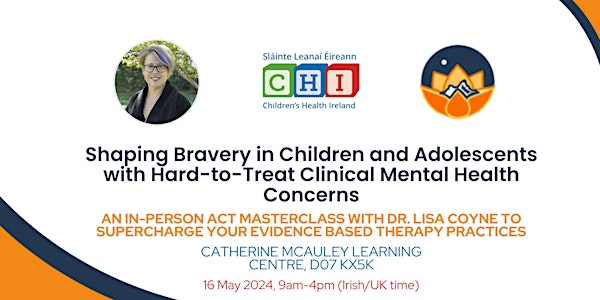
Shaping Bravery in Children and Adolescents with Mental Health Concerns
FINALLY! An ‘in person’ ACT workshop for training experienced clinicians to supercharge therapy practices with hard-to-reach populations
Date and time
Location
Catherine McAuley Centre
21 Nelson Street D07 KX5K Phibsborough IrelandRefund Policy
About this event
- 7 hours
Shaping Bravery in Children and Adolescents with Hard-to-Treat Clinical Mental Health Concerns
An in-person ACT masterclass with Dr. Lisa Coyne to supercharge your evidence based therapy practices
Epidemiological studies have estimated a lifetime prevalence rate of 28.8% for anxiety disorders (Kessler et al, 2005), and a recent meta-analysis of 87 studies across 44 countries estimated the global current prevalence of anxiety disorders at 7.3% (4.8–10.9%, adjusted for methodological differences across studies; Baxter, Scott, Vos, & Whiteford, 2012). In Ireland, children who have mental health difficulties when they are younger are more likely to experience these difficulties when they are older (Growing up in Ireland, 2016). Of course, this isn’t unique to Ireland as there have been increases in anxiety and depression seen in the USA too (Kids Count, 2022). Among young people, mental health challenges account for 45% of years lost due to disability (Gore et al, 2011). While exposure-based treatment for anxiety and OCD in youth and adult populations has robust empirical support, there is room for improvement. In terms of outcomes, intent-to-treat analyses suggest that approximately 1 in 5 individuals drop out of exposure treatment (Hofmann and Smits, 2008; Ong et al. 2016), and a significant of proportion of youth either do not improve or relapse (eg Ginsburg et al., 2013; 2018). Moreover, clinicians are unlikely to use exposure-based treatment even when it is needed (Freihart et al, 2004; Deacon et al., 2013; Sars & Van Minnen, 2015), due to their own experiential avoidance (Meyer et al., 2014; Scher, Herbert & Forman 2015). To complicate matters, simply adding ACT to ERP does not lead to demonstrably improved outcomes (Twohig et al., 2018). So, while exposure works, it could work better, and clinicians could get much more skilled and flexible in its use. Very likely, this will take a patient-centered “microanalytic approach” (Twohig et al., 2018) to improve outcomes of exposure-based approaches for individual clients in their specific contexts.
This workshop is for experienced clinicians with varying levels of either Acceptance and Commitment Therapy (ACT), Exposure and Response Prevention (ERP) (or other evidence based approaches) experience and will explore how to use ACT to enhance exposure-based treatment with children and adolescents through supporting curiosity, willingness, flexibility, and values-guided action. Specifically, the presenter will discuss how to incorporate specific ACT strategies into current treatment settings for a wide variety of mental health conditions experienced by child and adolescent clinical populations who simply are not benefiting from treatment as usual. Rather than teaching children and adolescents how to avoid painful or difficult thoughts and feelings, the ACT approach teaches clients how to live their lives anyway when difficult thoughts, feelings and life experiences are here. Case examples will be used to illustrate therapeutic techniques, in addition to discussion of the academic research base and the workshop’s didactic content.
After this presentation, participants will be able to:
1. Describe how the ACT approach to child and adolescent mental health approach can enhance your current ways of working.
2. Engage child and adolescent clients more effectively using valuing as action and direction to “contextualize” distress within the course of everyday living rather than part of pathologizing their experiences of anxiety/depression or other significant mental health conditions.
3. Describe a developmental model of ACT (e.g., DNA-V model) and how we might think about behavior as functioning for each individual when difficult to treat conditions are present.
Bio:
Dr. Lisa Coyne is the Founder and Senior Clinical Consultant of the McLean OCD Institute for Children and Adolescents at McLean Hospital and is an Assistant Professor at Harvard Medical School. She is the Founder and Executive Director of the New England Center for OCD and Anxiety (NECOA) and is Past President of the Association of Contextual Behavioral Science (ACBS). She is member of the Clinical and Scientific Advisory Board and is on the Faculty of the Behavior Therapy Training Institute (BTTI) of the International OCD Foundation (IOCDF). She is also a licensed psychologist, a peer-reviewed ACT trainer, and author. She has authored multiple peer reviewed scientific articles and book chapters on ACT with children and adolescents and is a co-author of the books Acceptance and Commitment Therapy: The Clinician’s Guide for Supporting Parents (Elsevier), The Joy of Parenting (New Harbinger), Stuff That’s Loud: A Teen’s Guide to Unspiralling When OCD Gets Noisy (New Harbinger & Little Brown), Stop Avoiding Stuff: 25 Microskills to Face Your Fears and Do It Anyway, were published in 2020, Tired of Anxiety; A Kid’s Guide to Be-Friending Scary Thoughts and Living your Life Anyway (Pavilion, 2022), and Tired of Teen Anxiety; A Young Person’s Guide to Discovering Your Best Life (and Becoming Your Best Self) (Pavilion, 2023)
Please ensure you book in advance as places are limited. Tickets are available for purchase up to one week before the event. Refunds will not be offered.